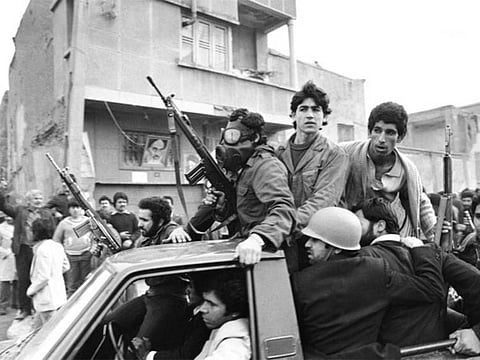A revolution of discord and despair
For 40 years, Iran has chosen aggression and confrontation as its operational philosophy

On February 11, 1979, massive protests on the streets of Iran’s major cities paved the way for the collapse of the pro-US monarch, Reza Shah Pahlavi.
Forty years on, the aftershocks of the revolution led by Ayatollah Khomeini are still being felt, both inside Iran and in the Middle East.
The Shah was seen as a pillar of stability and a symbol of US influence in the region, especially since the Cold War war was at its peak.
The Shah’s brutal regime was ousted, but the one that took over has turned out to be just as bad, in that it has relentlessly pursued the objective of destabilising its neighbours.
It has made interference in the affairs of other countries a cornerstone of its foreign policy.
To achieve this goal, Tehran has built, funded, and trained armed non-state actors and other subversives in the Arab world.
It has also worked hard to rachet up sectarian tensions in the region, which have led to untold discord and violence in the Arab world and beyond.
Iran continues to occupy the three UAE islands of Abu Mousa near the mouth of the strategic Strait of Hormuz, along with Greater and Lesser Tunbs.
It has helped prop up Syria’s President Bashar Al Assad during nearly eight years of civil war.
It aids the Al Houthi militia that toppled the legitimate government of Yemen and set in motion a chain of events that has led to widespread destruction in that country.
It shows no sign of stopping meddling in the affairs of Gulf countries, primarily Bahrain.
In Iraq, Iran’s malign influence has spread to the very core of the state, with numerous sectarian militias armed and funded by Tehran doing its bidding, against the wishes of ordinary Iraqis.
Above all, Iran has created the world’s most heavily armed militant organisation, Hezbollah, which has virtually hijacked Lebanon and emerged as a state within a state.
While the government wove adventurism into its foreign policy, the people in Iran have borne the consequences, in the form of tough sanctions that reached its zenith last year under the Trump administration in Washington, given Tehran’s pursuit of nuclear weapons.
Iran is an ancient civilisation.
It’s undeniably a core part of the Middle East, and its people are some of the most talented in the region. It is blessed with natural resources.
If the Iranian government had adopted good neighbourliness, a lot could have been achieved. Instead, it chose aggression and confrontation as its operational philosophy.
And the results have been disastrous.



